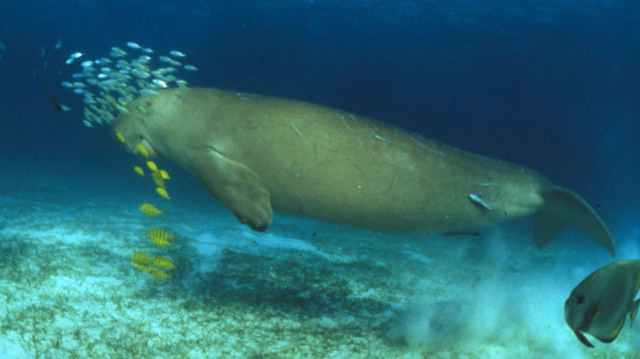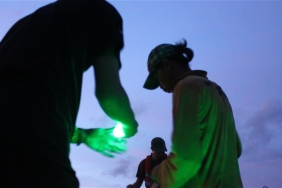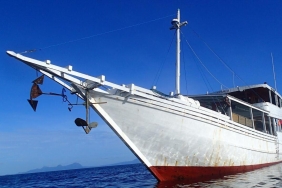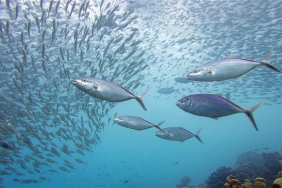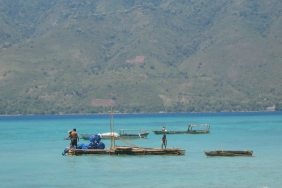THREATS TO THE SUSTAINABILITY OF DUGONG AND SEAGRASS HABITATS
By: Adella Adiningtyas (Marine & Fishery Campaign and Social Media Assistant)
Tula-Tulana Wa Ndiu-Ndiu is a way for the people of Buton Islands to learn to love humans and dugongs. The local wisdom that grows is passed down from generation to generation to build the character of the people in the Buton Islands in preserving dugong. The values contained in Tula-Tula Wa Ndiu-Ndiu are firmly held as unwritten rules through a sense of patience, responsibility and honesty.
The interesting story revealed in the 2016 National Symposium on Dugong and Seagrass Habitat which took place on April 20-21 in Bogor reminds us of the dugong as an endangered marine mammal. Data and information limitations, seagrass habitat destruction, lack of dugong research in Indonesia, lack of monitoring and law enforcement, smuggling, illegal trade and stranding and bycatch phenomena are issues and problems related to dugong and seagrass habitat conservation measures in Indonesia.
The first symposium to discuss the issue of dugong and seagrass habitats raised the theme "Joint Initiatives for the Preservation of Dugong Populations and Seagrass Habitats in Indonesia", initiated by the Ministry of Maritime Affairs and Fisheries in collaboration with the Bogor Agricultural University (IPB) as the event coordinator along with the Indonesian Institute of Sciences (LIPI) and WWF-Indonesia.
"The joint initiative was carried out to preserve the dugong and its habitat because if the dugong becomes extinct, it is feared that we will no longer have seagrass beds and other fish species that live there. So, by saving the dugong from the threat of extinction, indirectly we also preserve seagrass beds and other marine biota," said Drs. Wawan Kiswara, M.Si from the Oceanographic Research Center, LIPI.
The same thing was also expressed by Dr. Ir. Luky Adrianto, M.Sc, Dean of the Faculty of Fisheries and Marine Science - IPB, that this joint initiative in conservation must also involve fishermen as important subjects. The urgency of saving dugong must be aligned with providing education to fishermen in coastal Indonesia. Fishermen need to know that dugongs are much more beneficial if they are not caught, because this is related to the ecosystem of seagrass habitats and other marine biota.
Joint Initiative to Preserve Dugong and Seagrass Habitat
The series of symposium events on the first day were divided into four topics of discussion, namely 1) Institutional, Regulatory, and Network Conservation of Dugong-Seagrass, 2) Dugong Biology, Population, and Pathology, 3) Dugong Distribution and Ecology, and Food Habitat, and 4) Threats, Awareness, and Sustainable Use. All four refer to the purpose of holding a national symposium to collect data and information on the current condition of dugong and seagrass habitats.
One of the results of the symposium, which was attended by 131 participants from various regions in Indonesia, was that in the period 2009 - 2016 there were at least 28 cases of dugong stranded in Indonesia, both alive and dead. Where it was reported that five of the incidents were dugong stranded alive and needed serious treatment so that they could be released back in good health.
Based on the phenomena and threats presented in the symposium, efforts are needed to conserve dugong. According to the Directorate of Conservation and Marine Biodiversity (KKHL), there is a need for habitat protection that is guarded and initiated in conservation areas, supervision through legal enforcement for dugong, conservation to grow the dugong population, and utilization of the area for local ecotourism activities both outside and inside the conservation area.
"Conservation has become a demand and need that must be met as a harmonization of the economic needs of the community. This is a task for us in dugong conservation that must be harmonized for the economy to remain sustainable," explained Syamsul Bahri Lubis, A.Pi, MM, in the process of discussing the topic of Institutional, Regulatory, and Networking of Dugong Conservation.
WWF-Indonesia's Coral Triangle Director, Wawan Ridwan, hopes that the symposium will not stop at collecting data and information. The symposium is just the first step. Given the importance of dugong and seagrass habitat, WWF-Indonesia strongly supports and will play an active role in dugong and seagrass habitat conservation programs by supporting KKP and working with other stakeholders such as LIPI and IPB to encourage sustainable management of dugong and seagrass beds. This is done by encouraging policy development (NPOA Dugong), facilitating research-study-monitoring related to dugong and seagrass habitat, increasing public awareness through campaigns, and increasing the capacity/empowering local communities to understand the urgency of conserving dugong and seagrass habitat.

